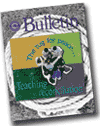

September 2001 Issue Main Page
—
About this issue
—
The tug of peace ...
—
Turning tangles of tension ...
—
A culture of peace
—
Bringing care to those in need
—
Tying a knot ...
—
Combating fear with nonviolence
—
In the way: Bearing witness against violence
—
Waging justice for children through advocacy
—
Cortright: Seek relationship, not revenge
—
SST endings and begining

About this issue: Peace and purposeMany of us can remember a first conversation in Sunday school about the Matthew 18 lesson in which Peter asks Jesus how many times one should forgive another … “As many as seven times?” Jesus’ response is “70 times seven.” On hearing this, my first thought leaned toward the literal: “We only have to forgive someone 490 times?” Around the table in my Sunday school room, the idea seemed as likely as that of a class visitor who had bragged to us that he intended to save his weekly 25-cent allowance to buy a Rolls Royce. In these situations, we elementary schoolers could see only concrete goals – both seemingly impossible to reach – and we wondered how to get along in the meantime.What we were not able to see, probably not even fathom, was that it was not the goal but the process that was most important. We were to work at forgiveness and understanding. And in the process of forgiveness, transformation is possible for everyone. The skills in forgiveness, according to Ephesians, include being kind and considering the perspective of another; letting go of bitterness and thoughts of revenge; treating others gently, with a tender heart that accepts the hurt; and lovingly forgiving each other. To do this, we “make ourselves vulnerable,” said Ruth Krall, professor of Bible, nursing and psychology and director of peace, justice and conflict studies, in a thoughtful presentation to faculty members during our fall retreat. She said reconciliation is a journey, acknowledging that the spirit must be transformed in order to make forgiveness relevant to others, to heal and to make new. These are difficult lessons. It is frightening to make ourselves vulnerable in a world that – though growing increasingly interconnected – is often polarized, between individuals, ethnic and religious communities, economies, political and environmental issues and more. Goshen College’s mission is to prepare “servant-leaders for the church and world.” Can we, Krall asked, “share in the brokenness of the world we cannot anticipate … [and] swing the balance toward healing?” Throughout her years of directing peace studies at Goshen, Krall, building on institutional history, has emphasized and supported peace-related components across academic and campus life – through forums, student groups, conferences, the arts, cross-listed courses, the longtime minor and new major and more. The purpose is to prepare students of all majors to seek throughout their lives to repair the “brokenness of the world” with peace and justice restored as their goals, knowing conflict is as inherent to humans as our desire for love. At the least, transformation can be achieved – quarters can add up to a Rolls Royce. In this issue, we look at the cross-disciplinary nature of peace, justice and conflict studies at Goshen College as well as special programs committed to peace journeys. Read what faculty are thinking about, and how a current student and numerous alumni are working for a more just – even forgiving – world. Continuing our “open invitation,” we hope you will take time to share with us your own experience with Goshen College and how it has affected your life – your faith, vocation, friends and family, international connections, etc. Contact me at racheljl@goshen.edu or Rachel Lapp, Goshen College, 1700 South Main Street, Goshen, IN 46526; call (574) 535-7569 or (800) 348-7422, ext. 7569. |
